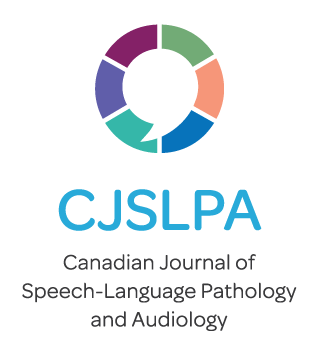

| Author(s) |
Barbara Jane Cunningham Olivia M. Daub Janis Oram Cardy |
| Volume | 45 |
| Number | 1 |
| Year | 2021 |
| Page(s) | 41-58 |
| Language | English |
| Category | Research Article |
| Keywords |
Implementation Assessment Integrated Knowledge Translation Outcome Monitoring Speech-Language Pathology |
| Abstract |
The purpose of this quality improvement pilot was to evaluate the effectiveness of an online learning module for (a) changing speech-language pathologists’ perceptions about outcome monitoring and assessment protocols for children who are deaf or hard of hearing and (b) supporting speech-language pathologists’ understanding of evidence-based protocols to be implemented in their communitybased program. Using principles of integrated knowledge translation and the Ottawa Model of Research Use, an online learning module was designed to support the implementation of evidencebased assessment protocols for these children in a large publicly funded program in Ontario, Canada. A pre–post study was then conducted with 56 speech-language pathologists (56/73 who were invited, 77% response rate) who took a pre-module survey, completed the online learning module, and then immediately took a post-module survey. After completing the learning module, speech-language pathologists reported improved perceptions about outcome monitoring, good understanding of the procedures to be implemented, and intentions to implement the new procedures into practice. Implementation materials were rated as highly valuable. Online learning modules can be used to effectively translate evidence-based assessment procedures to speech-language pathologists. Developing interventions using theory and in collaboration with stakeholders can support the implementation of these types of procedures into practice. L’objectif du présent projet pilote d'amélioration de la qualité était d'évaluer l'efficacité d'un module d'apprentissage en ligne pour (a) changer la perception des orthophonistes à propos des protocoles de suivi et d'évaluation utilisés avec les enfants sourds ou malentendants et (b) aider les orthophonistes à comprendre les protocoles fondés sur les données probantes qui seront intégrés au programme communautaire dans lequel ils travaillent. En utilisant les principes de transfert des connaissances intégré et le modèle d'utilisation de la recherche d’Ottawa, un module d'apprentissage en ligne a été conçu pour soutenir l’intégration de protocoles d'évaluation fondés sur les données probantes auprès d’enfants sourds ou malentendants dans un programme de grande envergure financé par le gouvernement de l’Ontario, au Canada. Une étude pré-post a ensuite été réalisée auprès de 56 orthophonistes (56 des 73 orthophonistes qui ont été invités ont pris part à l’étude, ce qui donne un taux de réponse de 77%). Ceux-ci ont d’abord répondu à un questionnaire, ils ont ensuite complété le module d'apprentissage en ligne, puis ils ont répondu à un deuxième questionnaire (immédiatement après avoir complété le module). Après avoir terminé le module d'apprentissage, la perception des orthophonistes concernant le suivi du développement des habiletés était meilleure et les orthophonistes rapportaient avoir une bonne compréhension des procédures qui seront intégrées et des intentions derrière l’intégration des nouvelles pratiques. Le matériel supportant l’intégration a été jugé comme étant très utile. Des modules d'apprentissage en ligne peuvent donc être utilisés pour traduire efficacement aux orthophonistes des procédures d'évaluation fondées sur les données probantes. Développer des interventions en utilisant la théorie et en collaborant avec les acteurs principaux peut soutenir l’intégration de ce type de procédures fondées sur les données probantes dans la pratique. |
| Record ID | 1272 |
| Link | https://cjslpa.ca/files/2021_CJSLPA_Vol_45/No_1/CJSLPA_Vol_45_No_1_2021_1204.pdf |
CJSLPA is an open access journal which means that all articles are available on the Internet to all users immediately upon publication. Users are allowed to read, download, copy, distribute, print, search, or link to the full texts of the articles, or use them for any other lawful purpose.
CJSLPA does not charge authors publication or processing fees.
Copyright of the Canadian Journal of Speech-Language Pathology and Audiology is held by Speech-Language and Audiology Canada (SAC). Appropriate credit must be given (SAC, publication name, article title, volume number, issue number and page number[s]) but not in any way that suggests SAC endorses you or your use of the work. You may not use this work for commercial purposes. You may not alter, transform, or build upon this work.